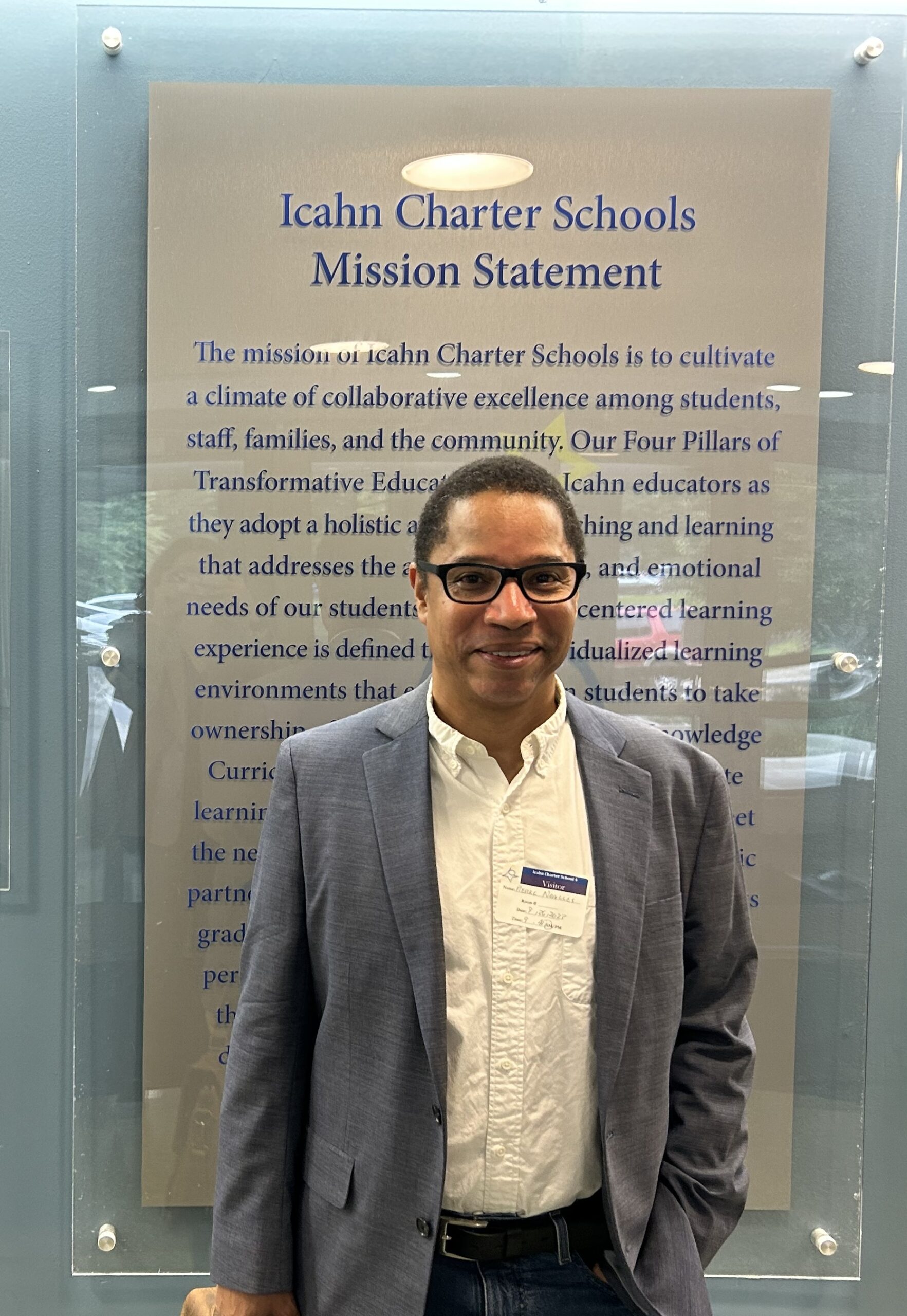
Why? What? How? From the moment we learn to speak, we ask questions. Scientists never stop. “A PhD is a license to learn. We are knowledge workers and that expertise can have a broad application,” explains EnCorps Fellow and NY City public school science teacher, Dr. Pierre Noailles.
Noailles, a career researcher and educator earned his PhD in biology with a specialty in physiology and neuroscience from City University of New York and a master’s degree in epidemiology from UC Berkeley. He is working towards his grade 7-12 biology teaching certification at the Relay Graduate School of Education.
“My goal is not to make another scientist,” explains Noailles. “My goal is to create scientific literacy and community action.”
Noailles joined the EnCorps STEM Teachers Program® with the goal of teaching in under-served communities. Noailles wants his students to be critical thinkers who understand the impact of environmental decisions. He wants them to be engaged as problem solvers when, for example, a nearby incineration plant is negatively impacting their community.
In October 2023, Pierre was hired at Icahn Charter School 4 in Bronx, NY to teach 7th and 8th grade science, following his volunteer guest teaching as an EnCorps Fellow.
“There’s a certain aliveness to interacting with this age group. When I teach them concepts like the scientific method and experimental design, for example, I do so from real-world experience. It is rewarding to frame for them this life long discussion with science.”
When theory can be linked to practice, there’s a certain ‘wow’ factor. Noailles’ students are especially interested in hearing about his research on how the drug meth impacts brain development and causes neurodegenerative effects in animal models. Expertise aside, Noailles carefully considered what kind of teacher he wanted to be in order to inspire his students.
“I chose to earn my 7-12th grade teaching credentials because I am a good match in terms of what I can provide my students, including my temperament and my knowledge base.”
His advice for other STEM professionals is to find their fit and try to work with the youngest age group to make a difference early on in their education.
While Noailles looks back fondly on his teachers, especially his memorable 7th grade algebra teacher, he didn’t need to be steered as a student. His parents, originally from Haiti, valued education. “There was an assumption of performance, not even spoken aloud,” explains Noailles.
His mother worked as a nurse. His father, an American Navy Veteran and mechanical engineer by training, worked as an accountant. “While the 1950s New York was generally more progressive than many other parts of the country, discrimination did exist, including within labor unions. Some unions had exclusionary practices that made it difficult for Black workers to gain membership, which in turn affected their employment opportunities and wages,” explains Pierre.
Today, the STEM workforce still lacks racial, ethnic and gender diversity, a problem that organizations like the National Society of Black Engineers (NSBE) are tackling.
According to a Pew Research Center article, women make-up 50% of the STEM workforce, but they are mostly employed in health-related fields. Women make up 24% of computer occupations and 14% are engineers or architects. African American, Black and Latinx workers remain underrepresented in STEM: only 8% of STEM workers are Latinx/Hispanic and 9% are Black/African American.
The data reflects Noailles experience: “My entire career, I was often the only person of color in the room. Representation matters. It is important for students to see people like me who have done the job.”
Noailles’ passion for teaching in an under-served community is deeply rooted in his personal experience. He understands the transformative power that a dedicated and caring teacher can have on a student’s aspirations and self-perception.
For Noailles, becoming a high school science teacher is “…a culminating achievement as a long career in sciences.”
Fun Facts About Pierre:
- Born and raised in New York
- Graduate of the Bronx High School of Science
- STEM Education:
- PhD in biology with a specialty in physiology and neuroscience, City University of NY
- Master’s in Epidemiology, UC Berkeley
- Teaching Credentials:
- Graduate Program, Relay Graduate School of Education
- Grade 7-12 Biology
- Member of Associations:
- American Public Health Association
- Coalition for Science After School
- Who is your favorite scientist?
- Rita Levi-Montalcini, Santiago Ramón y Cajal, Neil deGrasse Tyson. All for reasons not necessarily related to their scientific achievements. It’s a much longer list. We stand on the shoulders of giants after all.
- What scientific problem would you want your students to solve?
- “My goal is not so much to help them solve a particular problem as it is to help them to become scientifically literate. Science literacy is not just about knowing facts; it’s about understanding the scientific method, recognizing the value of evidence-based reasoning, and applying these skills to various aspects of life, from healthcare to environmental stewardship to social issues. Once they can embrace their identities as critical thinkers who are scientifically literate, they can apply it to questions most relevant to them and their community.”
- What aspect of the EnCorps STEM Teachers Program did you appreciate the most?
- “My program coordinator, Courtney, matched me with a school to ensure I completed my volunteer guest teaching in a setting able to support a new teacher like myself.”
